|
|
|
Sort Order |
|
|
|
Items / Page
|
|
|
|
|
|
|
| Srl | Item |
| 1 |
ID:
154654
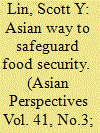

|
|
|
|
|
| Summary/Abstract |
During the twenty-first century's wave of transnational farmland investment, Asian countries contributed to about half of the investment. I therefore address the following major questions: What is the food security situation across Asian countries? What are the factors that drive Asian countries to join the transnational farmland investment movement? I argue that the following four factors give rise to the security problems in the food supply chain of Asian countries: (1) the developmental state model that leads Asian countries to sacrifice agriculture in their home countries; (2) the increases in food demand resulting from accelerated urbanization; (3) an unstable food supply chain causing Asian countries to seek reliable bases of food supply; and (4) food safety concerns that drive Asia to look for better quality farmlands. Today, as transnational farmland investment has become one of the models to maintain Asian countries' food security, this Asian model is also challenging contemporary global food security governance dominated by Western countries. The changes that it will effect over the course of this arduous process will also inform and shape future research within academia.
|
|
|
|
|
|
|
|
|
|
|
|
|
|
|
|
| 2 |
ID:
154648
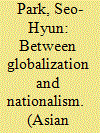

|
|
|
|
|
| Summary/Abstract |
Why, in recent years, has the South Korean government introduced various changes in its immigration policy, diverging from a long history of relative closure toward foreign workers in the East Asian region? While existing studies on labor migration utilize pluralistic models of interest aggregation and competition, examining the preferences of different domestic groups such as firms, native labor, and foreign-born immigrants, immigration has long remained underpoliticized in South Korea. Indeed, until the 2000s, the central government maintained strict policies banning the import of foreign labor, overruling other important economic or environmental factors such as sector-specific needs or a shrinking domestic workforce due to an aging population. In this article, I argue that a new political framing of immigration, made possible through a shifting domestic political context in which global human rights norms became more salient, led to important policy changes in the past decade. The South Korean case suggests that globalization has led to greater acceptance of foreign workers, less as a result of economic pressures but rather the pull of global standards, based on the Korean yearning for segyehwa (to become global) and becoming an “advanced” nation.
|
|
|
|
|
|
|
|
|
|
|
|
|
|
|
|
| 3 |
ID:
154652
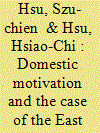

|
|
|
|
|
| Summary/Abstract |
China's declaration of an air defense identification zone (ADIZ) in the East China Sea shocked the international community, and many explanations have been offered about the motivation behind it. We argue that domestic politics played a key role in the ADIZ policy. However, existing studies have not paid sufficient attention to decisionmakers' political motivation. To fill this gap, we explore two distinct models: the diversionary foreign policy model and the mobilization model. Both models focus on the linkage between the state leader's domestic political consideration and foreign policy behavior, but each has different theoretical and empirical implications. Our findings suggest that the mobilization model offers a better explanation of the motivation for China's move.
|
|
|
|
|
|
|
|
|
|
|
|
|
|
|
|
| 4 |
ID:
154649
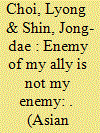

|
|
|
|
|
| Summary/Abstract |
In this article we examine the exceptional case of South Korea's establishment of cooperative relations with Iran, despite the latter's confrontation with the United States, South Korea's closest ally, in the late 1970s and early 1980s. We discuss the conventional idea of the imbalanced relationship—the enemy of my ally is not my enemy—to explain South Korea's approach toward Iran, evaluate its past and current relations, and offer policy suggestions for the future relationship between the two countries. Using newly discovered archival resources and political records from South Korea, we provide a more exact picture of the international relations among South Korea, Iran, and the United States in the early 1980s.
|
|
|
|
|
|
|
|
|
|
|
|
|
|
|
|
| 5 |
ID:
154651
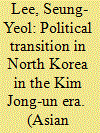

|
|
|
|
|
| Summary/Abstract |
North Korea has already begun the process of transition, the patterns of which will be determined by the elites' choice. System transition in North Korea may unfold in one of two ways: gradual transition, with the maintenance of the Suryong (supreme leader) system of communist power and acceptance of the market economy for the well-being of the people; or radical transition accompanied by sudden political change, which may lead to conflict between competitive elite groups before Kim Jong-un has time to solidify his hold on leadership. Which path will North Korea follow? In the era of Kim Jong-un, everything depends on the competition between the party elite and military elite.
|
|
|
|
|
|
|
|
|
|
|
|
|
|
|
|
| 6 |
ID:
154646


|
|
|
|
|
| Summary/Abstract |
A democratic recession coupled with China's rise has reopened the Asian values debate between modernizers in favor of Western liberal democracy and traditional adherents to Confucianism. Using data from the third wave of the Asian Barometer Survey (2010–2012), we reexamine this debate by considering the implications of Confucian values for democratic orientations in seven societies: Japan, South Korea, Taiwan, Hong Kong, Singapore, mainland China, and Vietnam. Our findings support the argument that, although traditionally Confucian societies have developed a belief system and culture different from the West, such a system does not preclude the emergence and divergence of democracy. Indeed, East Asians tend to define democracy in terms of social equity and good governance (performance-distributive democracy) rather than liberty and democratic procedures (liberty-procedural democracy).
|
|
|
|
|
|
|
|
|
|
|
|
|
|
|
|
|
|
|
|
|